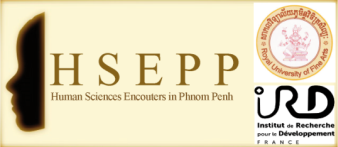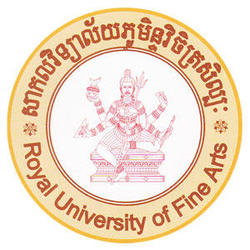Project initiators and partners
Initiators
UMI 233 trans VIH MI/INSERM U 1175
Université Royale des Beaux Arts Phnom Penh
Partners
http://sites.sas.upenn.edu/tlc/
logo tlcAgence Universitaire de la Francophonie - Bureau Asie Pacifique
HSEPP support the Manusastra Project
‘‘Contested Memory, Documentary Registers, and Cambodian/American Histories of Violence’’ Lina Chhun
‘‘Contested Memory, Documentary Registers, and Cambodian/American Histories of Violence’’
By Lina Chhun
Friday, March 04, 2016, at 5:30 PM
Meeting Room, Royal University of Fine Arts, Phnom Penh
Abstract:
Processes of remembrance and commemoration are highly fraught; how and what we remember are mediated, individually as well as collectively. Oftentimes, when we construct historical memory, we privilege what Veena Das (2007) calls “the event” of violence—a process that simultaneously makes an event historically legible while obscuring its conditions of emergence. Memory-making thus, is always punctuated by acts of forgetting, the creation and proliferation of silences that produce historical amnesias as they also produce, paradoxically perhaps, affective remnants—what Ngô, Nguyen, and Lam (2012) refer to as “the particular resonances of…wars, refugee archives of feeling, and the recursive traces of both” (673).
Foregrounding an Asian Americanist critique of empire, and deploying an analysis of exception(alism) as the central device in this exploration of what Yoneyama (1999) terms the dialectics of memory and the construction of historical narrative regarding Cambodia, Ms Chun begins with an analysis of the unofficial register of her father's oral history interview regarding the U.S. bombing of Neak Leung. She then transitions to a discussion regarding the relationship between archives and contested memories in the afterlife of violence, illustrating the possibilities of reading her father’s story as documentation alongside what she terms two “archival collections.” Analyzing how these cases differentially fulfill the traditional archival purposes of documentation, transparency, and accountability, she turns to an engagement with the ways in which these archives might function to produce different claims to “historical truth” in the afterlife of violence. In doing so, she addresses the following questions: How might we make historical silences legible without reproducing a regime of truth invested in discrete events of (spectacular) violence? In relationship to Jodi Kim’s (2010) notion of the protracted afterlives of historical violence, how might we also do so without reifying a narrative of (U.S.) exception(alism) that allows us to forget the ongoing violences of militarism and empire?
Bio:
Lina Chhun is a doctoral candidate and fifth year graduate student in the Department of Gender Studies at the University of California, Los Angeles (UCLA). Lina currently holds a Master’s degree in Social Psychology from the University of California, Santa Cruz and a Master’s degree in Gender Studies, with a Certificate in Asian American Studies from UCLA. Her research focuses on questions of memory, mediation, narrative, and the production of history in the afterlife of violence, with an attunement to registers/ registerings of historical trauma relating to the Cambodian genocide of 1975-1979.








